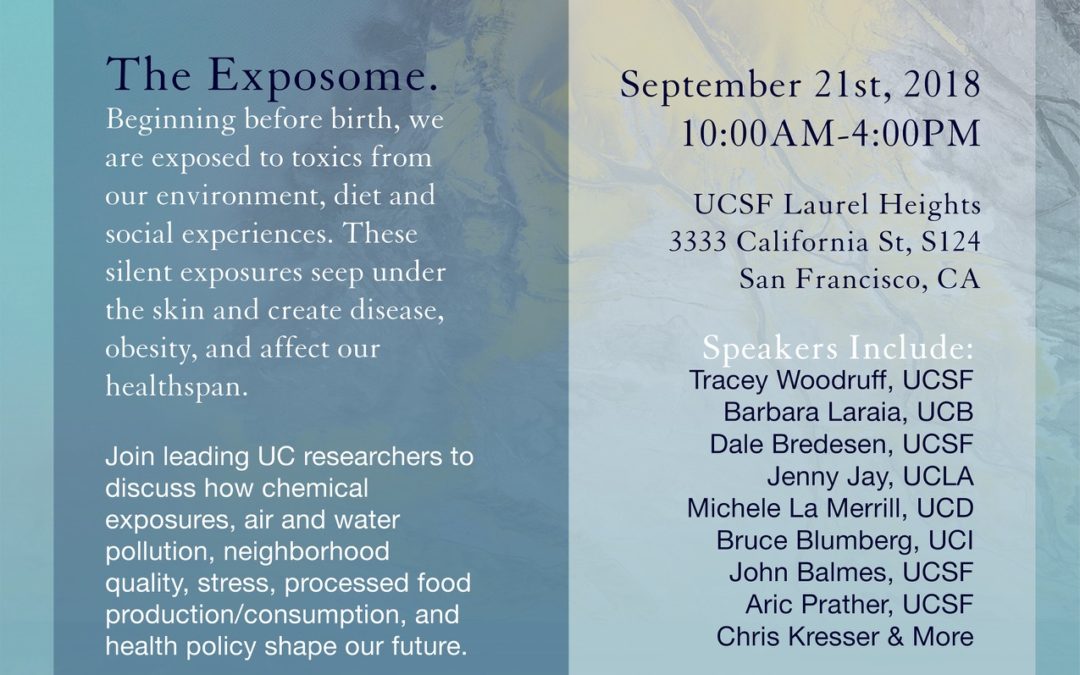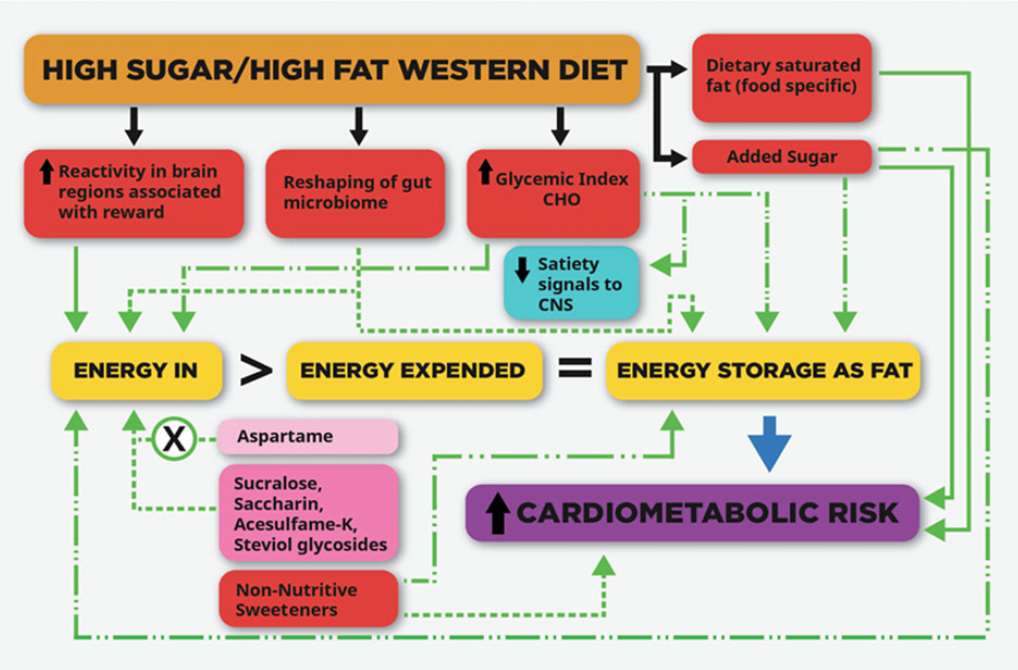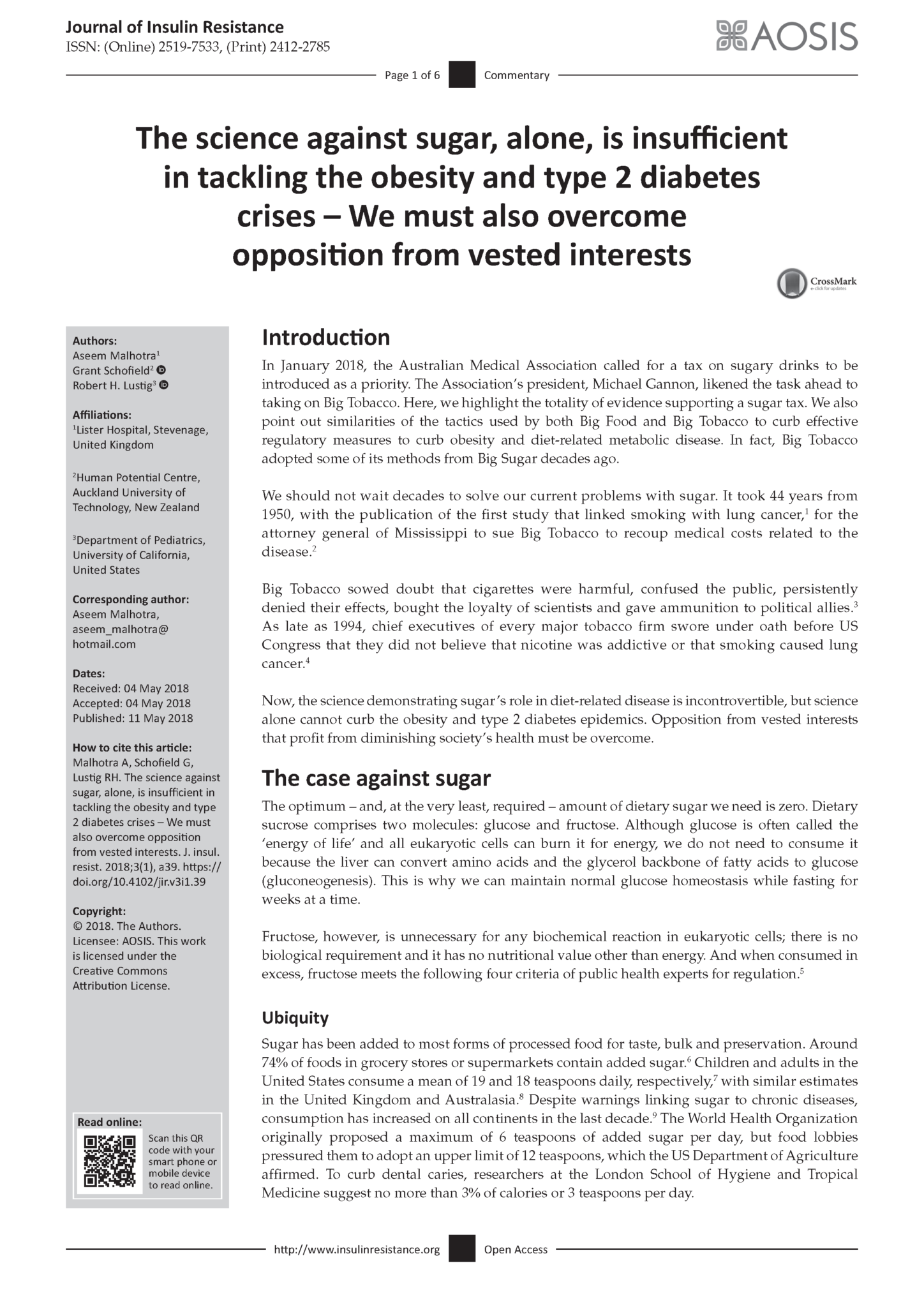

The ADA just released its new guidelines for pediatric type 2 diabetes…
“In youth-onset type 2 diabetes, the major modifiable risk factors are obesity and lifestyle habits of excess nutritional intake, low physical activity, and increased sedentary behaviors with decreased energy expenditure, resulting in the surplus of energy being stored as body fat.”
Worst yet, the authors are my Pediatric Endocrine academic colleagues. They should know better. I’m supremely disappointed in them.

Butter Battle 2.0
The Guardian enters “The Butter Battle 2.0”. More heat than light.
Here are the 10 things everyone need to know to navigate this minefield.
- LDL-Cholesterol (LDL-C) levels (from dietary fat) correlate (but poorly)
with CV mortality. - Triglyceride levels (from dietary sugar) correlate (much better) with CV mortality.
- LDL particle number (LDL-P) is the right measure for CVD, and higher is worse. But a standard lipid profile measures LDL-C, not LDL-P. Wrong test.
- Dietary fat raises LDL-C, but not necessarily LDL-P, while sugar raises triglyceride levels.
- Red meat is associated with increased CVD. But maybe not because of its saturated fat. In fact, dairy saturated fat is protective against CVD.
- If you have a super high LDL-C (over 200), then you probably also have a high LDL-P, and you might need a statin.
- If your LDL-C is between 70 and 200, maybe your LDL-P is high, but maybe it is not. Statins are not prescribed based on LDL-P; they are prescribed based on LDL-C. This is a bad idea, yet doctors do it all the time.
- 4/5 of the people taking statins were prescribed for high LDL-C. But this is the wrong reason. And 20% of statin takers get side-effects.
- That doesn’t mean you should stop your statin. But it also doesn’t mean you can eat butter without abandon.
- A doctor who knows what they are doing can figure your situation out. But most don’t know what they are doing; they do as they’re told.
Reference:

Fiber
There are two kinds of fiber. Soluble (e.g. pectins, inulin), and insoluble (cellulose). You need both. When you have both, 6 good things happen:
- The insoluble fiber forms a latticework in the duodenum, and the soluble fiber plugs the holes in the latticework to create an impenetrable secondary barrier. This limits simple carbohydrate absorption in the duodenum, thus preventing the liver from receiving all that carbohydrate at once, tamping out the tsunami of carbohydrate.
- This also reduces the glycemic excursion in the blood, so that the insulin response will be attenuated.
- If the carbohydrate isn’t absorbed in the duodenum, it goes to the jejunum, where the microbiome is, promoting microbial diversity and gut health.
- Grains are covered in insoluble fiber (the husk). If you consume them whole and non-pulverized, the enzymes in the intestine have to strip that covering off before the starch is released. That takes a lot of time, and so it happens later in the intestine, so the the bacteria can get to it.
- The soluble fiber can be fermented by intestinal bacteria to make short chain fatty acids, which also suppress insulin release and improve gut health.
- The insoluble fiber acts like little “scrubbies” on the inside of your colon to remove old and damaged cells, thus reducing risk for colon cancer.
The best fiber is where there is both soluble and insoluble. That’s everything that comes out of the ground — before it’s processed. As soon as it’s processed, it loses many of these six properties.
Photo credit: Fancycrave, Unsplash

Metabolic Syndrome and Mental Health
METABOLIC SYNDROME AND MENTAL HEALTH
Modern health means metabolic health. The main pathway to chronic diseases today is the breakdown of our finely tuned metabolic machinery inside, due to processed food, lifestyle and – mental health? Stress and depression have potent effects on our behavior and creating imbalance of hormones such as glucose, insulin and inflammation. Poor mental health contributes to the metabolic syndrome, a cluster of common maladies including a large waist, high lipid levels and blood pressure, breakdown of the balance between insulin and glucose, and the most invisible to all, a fatty liver. You will hear from four experts in this area on the important topics of nutrition, optimal daily habits and how to prevent depression and the cascade of dysregulation that manifests as the metabolic syndrome.

Elissa Epel, Ph.D, is a Professor in the Department of Psychiatry at UCSF. Epel studied psychology and psychobiology at Stanford University (BA), and clinical and health psychology at Yale University (Ph.D.). She completed a clinical internship at the Palo Alto Veterans Healthcare System. Her research aims to elucidate mechanisms of healthy aging, and to apply this basic science to scalable interventions that can reach vulnerable populations. She is the Director of the Aging, Metabolism, and Emotions Lab, and the Center for Obesity Assessment, Study, & Treatment, (COAST), and Associate Director of the Center for Health and Community. With her collaborators, she is conducting clinical trials to examine the effect of self-regulation and mindfulness training programs on cellular aging, weight, diet, and glucose control.

Wolfram Alderson’s career in pursuit of social and environmental change spans across four decades. He currently serves as CEO of the Hypoglycemia Support Foundation. The broad focus of his lifetime of work has been improving human and environmental health–often by developing programs and organizations that accomplish both. In addition to being a social change agent, Wolfram is also a visual artist and writer, and has built two major therapeutic arts programs, one for refugees and one for abused children.

Dr. Lustig specializes in the field of neuroendocrinology, with an emphasis on the regulation of energy balance by the central nervous system. His research and clinical practice has focused on childhood obesity and diabetes. Dr. Lustig holds a Bachelor’s in Science from MIT, a Doctorate in Medicine from Cornell University Medical College, and a Master’s of Studies in Law from U.C. Hastings College of the Law. Dr. Lustig is the author of the bestselling books The Hacking of the American Mind: The Science Behind the Corporate Takeover of Our Bodies and Brains and Fat Chance: Beating the Odds Against Sugar, Processed Food, Obesity and Disease.
Dr. Rasgon is a professor in the departments of Psychiatry and Behavioral Sciences and Obstetrics and Gynecology at Stanford University’s School of Medicine. She began her distinguished career at Odessa Medical Institute and UCLA School of Medicine, and in 2002, she established the Center for Neuroscience in Women’s Health at Stanford University. Dr. Rasgon is considered a renowned expert in neuroendocrinology and women’s mental health. Dr. Rasgon is the author of more than 165 peer-reviewed publications, 25 book chapters, and is a reviewer for 30 professional journals. Her predominant research focus has been on neuroendocrine correlates in various models of affective and cognitive neuroscience, the treatment of bipolar disorder in women, the use of hormonal interventions during menopause and the effects on mood and cognitive function, and the interplay between endocrine function and aging.
Get Tickets Here:
https://www.commonwealthclub.org/events/2018-11-01/metabolic-syndrome-and-mental-health
The Commonwealth Club
110 The Embarcadero
Toni Rembe Rock Auditorium
San Francisco, 94105
Coconut Oil – Poison?
The recent “news” about Coconut Oil may be inflammatory, but the oil is not.
Well, it’s sure not “poison”. Coconut oil has some palmitic (C16) acid, but also myristic (C14) and lauric (C12) acids. These fatty acids when free (non-esterified) are inflammatory, but in coconut oil they bound to glycerol, they are not “free”. They raise serum LDL levels, but the large buoyant, not the small dense LDL (the bad kind). There are benefits to medium-chain triglycerides (MCT’s), but coconut oil’s fats are larger than MCT’s. So coconut oil is no worse than saturated fat, and saturated fat has been shown to be neutral for CV disease and diabetes.

Checked your Exposome Lately?
UCSF to Lead The Exposome & Metabolic Health on September 21, 2018
Livestreamed Sugar, Stress, Environment and Weight Symposium Fuses Research and Action
UC San Francisco experts on environmental exposures, social adversity, and health policy will lead The Exposome & Metabolic Health on Friday, September 21st at UCSF Laurel Heights Auditorium from 10:00 a.m. to 4:00 p.m. (PT).
The event, the twelfth annual COAST/Sugar Stress Environment, and Weight (SSEW) Symposium, will unite researchers, healthcare providers, environmental health, and policy advocates from across the UC Campuses in a day-long conference focusing on how exposures from our environment, both chemical and psychological, get underneath the skin and affect human metabolic health and obesity.
Obesity and related chronic diseases, such as type 2 diabetes, are some of the leading health crises of the 21st century and scientists are still trying to understand how our ‘exposome’ may play a key role. The exposome encompasses all exposures within the human physical and social environments, including air pollution, chemicals, pesticides, processed foods, chronic stress, and even our neighborhoods.
In-person registration is free to the public and a free livestream link is offered to those who register through Eventbrite (www.exposomehealth.eventbrite.com)
“We are at a critical moment in the history of human health and the environment, and the science we will discuss is of utmost important to public health, policy, and individuals. We must raise awareness of how our air, our food, and our social environments are impacting our health in dramatic ways, affecting us now and affecting the next generations,” says Elissa Epel, PhD, Professor of Psychiatry and Director of the UCSF Consortium for Obesity Assessment Study and Treatment (COAST): “This symposium will cover critical new science and policy actions that are of interest to all, from students to scientists to our grandparents”.
Speakers and panelists will describe the wide reaching and invisible impact of social stress and environmental toxics in our air and food on obesity. “Science shows that we are all exposed to multiple industrial chemicals, many of which are a concern for metabolic diseases. Pregnant women, children, communities of color and low-income communities can be more impacted by these exposures increasing the urgency to take actions to prevent harmful exposures” said Dr. Tracey Woodruff, Director at UCSF Environmental Health Initiative, co-sponsor of the event.
Highlights include:
- Dr. Eve Ekman, a leading scholar and instructor of meditation and emotion regulation will begin the day with an introductory level meditation instruction, integrating environmental issues.
- Dr. Tracey Woodruff, Director of the UCSF Environmental Health Initiative, offers an overview of the field of toxic exposures and their impact on health outcomes.
Understanding our “social exposome”
- Dr. Aric Prather, UCSF Professor and Co-Director of the Consortium for Obesity Assessment, Study, and Treatment discusses how social stressors and relationships can act like environmental toxins, a concept called “social exposome”.
- Dr. Barbara Laraia, UC Berkeley Professor reveals why neighborhoods and stress have a major impact on obesity, especially during pregnancy.
Understanding interdependence with our food systems
- Dr. Jenny Jay, UCLA Professor and Researcher at the Institute of the Environment and Sustainability provides perspectives on how processed foods and water use impact both the environment and public health.
Understanding the impact of our personal choices
- Dr. Dale Bredesen, UCSF/UCLA Physician and leading expert on neurodegenerative diseases discusseshow environmental toxins may lead to Alzheimer’s disease.
- Wolfram Alderson, a social impact innovator and expert on how we can remove toxins from our personal ecosystems and our communities.
Understanding how chemical exposures work in the body
- Dr. Michele La Merrill, UC Davis Professor of environmental toxicology discusses clinical research on pesticides and metabolic health.
- Dr. Bruce Blumberg, UC Irvine Professor of Developmental and Cell Biology and leader in the field of “obesogens” discusses the role of exposures that disrupt our endocrine systems and promote obesity.
- Dr. John Balmes, UC San Francisco Professor gives insight on how air pollution impacts metabolic health.
Understanding policy implications and actions
- Dr. Laura Schmidt, Professor, UCSF, Co-Director of SSEW Initiative, and expert on food policy and food environment.
If you can’t make it in person, consider watching the talks live, or logging into Facebook and visiting the UCOP Page (facebook.com/universityofcalifornia) from 12:30pm-1:00pm and ask questions to researchers during a Facebook Live Panel.
Topics include how environment, diet, and social experiences affect the health of the next generation.
Panel moderated by Elissa Epel, PhD, UCSF and includes:
- Tracey Woodruff, PhD, UCSF Expert on how chemical exposures in pregnant women affect the next generation
- Kimberly Harley, PhD, UCB Expert on how youth are exposed to toxic endocrine disrupting chemicals through beauty and hair products
- Martyn Smith, PhD, UCB Will define the exposome and share how diet and environmental exposures impact cancers and child health
- Candice Price, PhD, UCD How diets high in sugar and soda are toxics that get under the skin, leading to metabolic disease and obesity
The Exposome & Metabolic Health is sponsored by COAST, SSEW, the UCSF Nutrition and Obesity Research Center, and the UCSF Environmental Health Initiative and the Center for Health and Community at UCSF. It is led by Drs.Elissa Epel, Laura Schmidt, and Samantha Schilf the Executive Director of the SSEW Initiative.
I am sweet enough
The “I am Sweet Enough” event brings together three world-renowned experts who will explain how and why cutting processed sugar from your diet is one of the best things you can do for your health.
Sunday September 16, 2018 – 1:00 p.m. – 4:00 p.m.
The Ben Sadowski Auditorium, Mount Sinai Hospital, Toronto
Brought to you by Renascent, a national leader in treating substance use disorders. Since 1970, Renascent has helped almost 50,000 people, becoming an accredited expert in providing hope and healing to individuals, families, loved ones, communities, and organizations impacted by addiction. Renascent’s Food Addiction Program is the first of its kind in Canada, applying an addiction model of care to help people find peace and freedom from their relationship with food.
Click here to register: https://renascent.ca/iamsweetenough/

Trump Derangement Syndrome – Is it real?
Everyone is worried about what happened to Trump’s brain, but no one seems to be particularly worried about what’s happening to ours. The Russians hacked the election, but it’s Trump who has hacked our minds. In fact, Trump has instead turned the tables and coined a new diagnosis in a tweet: “Some people HATE the fact that I got along well with President Putin of Russia. They would rather go to war than see this. It’s called Trump Derangement Syndrome!”
Click here to read the entire article in MedPage Today.

Beyond Calories: “The scientific community agrees: A calorie is NOT a calorie”
Academic Position Paper Concludes: Some Calories More Harmful than Others
“Beyond Calories” analysis finds unanimity among researchers on unique role sugar-sweetened beverages play in chronic health problems, despite challenges in current landscape of nutrition research
A position paper written by a group of twenty-two researchers and published in a leading scientific journal provides a comprehensive review of the current challenging landscape of nutrition research, including a notable warning that consumption of soda and other sugar-sweetened beverages increases cardio-metabolic risk factors.
The findings, published in Obesity Reviews and available online today [CLICK HERE FOR REPORT], are the result of a July 2017 academic conference hosted by the CrossFit Foundation. The conference convened the group of international nutrition scientists and researchers to review the current scientific record and the specific dietary components that lead to cardio-metabolic factors associated with obesity, cardiovascular disease, and type-2 diabetes, independent of caloric intake.
While the paper reviews the significant challenges involved in conducting and interpreting nutrition research—detailing the historically conflicting expert opinions regarding the health effects of food components such as fat, sugar, and carbohydrate—the participants did arrive at one conclusion: the consumption of sugar-sweetened beverages clearly increases risk factors for chronic diseases such cardiovascular disease, and type-2 diabetes, even compared with calorically-equal amounts of starch.
This finding and unanimity of scientific experts is notable because it undercuts the beverage industry’s focus on balancing calorie consumption with calorie expenditure. The industry’s “energy balance” argument falsely assures the consumer that sugar consumption is not uniquely harmful in its effect on obesity and cardiometabolic disease—claiming that, like any food, added sugar can fit into a healthy diet as long as the excess calories are burned through increased physical activity. However, the review of the evidence encapsulated within the “Beyond Calories” position paper confirms that some calories are more harmful than others in terms of their cardiometabolic effect, and that a healthy diet is about more than “energy balance.” The review summarizes evidence that risk factors even increase when sugars are consumed within diets that do not result in weight gain.
The paper’s finding also undercuts the beverage industry’s resistance to the development of consumption-focused health policies—such as soda taxes, warning labels, and marketing restrictions—that could impact the dramatic global rise in cardio-metabolic disease. The paper’s sugar-sweetened beverage finding is also relevant to recent legislative and legal battles, such as a 2017 Ninth Circuit court decision that prevented the City of San Francisco from implementing a soda warning label, which hinged upon the court’s determination of whether soda and other sweetened beverages are uniquely harmful to human health or merely one source of calories among many.
As a recent article in the Journal of the American Medical Association explained, “The court noted that…a clearer emphasis in the law on the special harms of SSBs [sugar-sweetened beverages], rather than added sugars in general, would have strengthened the government’s case.”
First author Dr. Kimber Stanhope of University of California, Davis, noted that the paper’s delineation of the challenges associated with conducting and interpreting nutritional research may help the public better understand inconsistencies in nutrition advice, and suggested that “this thorough academic review of the current body of nutrition research is a valuable contribution that may both improve the design of future research and focus attention on research areas that may have the greatest impact in slowing the epidemics of obesity, cardiovascular disease, and type-2 diabetes.”
The factors that lead to obesity and chronic disease are as complex as the human body itself. But while the authors’ findings were inconclusive in regards to several other questions such as low-fat versus low-carbohydrate diets, the scientists’ conclusions regarding the impacts of sugar-sweetened beverages were clear.
“The food and beverage industry has influenced the field of nutrition for decades by highlighting the health impact of caloric intake at the expense of other factors that might call their products into question,” said Director Olivia Leonard of the CrossFit Foundation. “These tactics have exerted a devastating impact on human health. We’re proud to support efforts to correct and inform public perception of the consumption and lifestyle choices that impact individual health.”
For more information about this paper, contact Josh Lahey: josh@lotsixteen.com
Tax sugary foods to reverse type 2 diabetes epidemic within 3 years
A new report from leading international obesity experts gives eight point plan to reverse epidemic of type 2 diabetes within 3 years.
- Recommendations also call for labelling of added and free sugars on products in tea spoons for the public to understand, a complete ban of all sugary drink advertising (including fruit juice) on TV and internet demand services and a ban of companies associated with sugary products from sponsoring sporting events.
- The authors state that the science against sugar alone is not sufficient to overcome the obesity and type 2 diabetes crisis, opposition from vested interests need to be overcome.
- The experts call for complete dissociation of dietetics organiZations from taking sponsorship money from food companies that market processed foods otherwise organizations such as the British Dietetic Association cannot claim their dietary advice is independent.
- A leading right wing UK think tank, The Institute of Economic Affairs is being called out as being a front group for industry interests
- “The public worldwide is being conned” says top international Professor of Food Policy
- The calls are backed by eminent international public health scientists including Professor of European Public Health Martin McKee, the Vice President of the UK Faculty of Public Health Simon Capewell, Professor of Food Policy at the Centre of Food Policy,City University of London,Tim Lang, and Policy Director of Baby Milk Action, Patti Rundall OBE.
Three international obesity experts, NHS Consultant Cardiologist Dr Aseem Malhotra, Professor Robert Lustig of the University of California San Francisco and Professor Grant Schofield, Auckland University of Technology have authored the most comprehensive up to date report on the science of sugar with an eight-point plan that if implemented will result in a reversal in the epidemic of type 2 diabetes within 3 years.
The peer reviewed academic publication entitled “ The science against sugar, alone, is insufficient in tackling the obesity and type 2 diabetes crises —we must also overcome opposition from vested interests” published in The Journal of Insulin Resistance makes comparisons with tackling the obesity epidemic with taking on Big Tobacco.
“We should not wait decades to solve our current problems with sugar. It took 44 years from the 1950 publication of the first study to link smoking to lung cancer, to the attorney general of Mississippi suing Big Tobacco to recoup medical costs related to the disease.
Big Tobacco sowed doubt that cigarettes were harmful, confused the public, persistently denied their effects, bought the loyalty of scientists, and gave ammunition to political allies” they write.
“Now, the science demonstrating sugar’s role in diet-related disease is incontrovertible, but science alone cannot curb the obesity and type 2 diabetes epidemics. Opposition from vested interests that profit from diminishing society’s health must be overcome.”
“As with tobacco, policy changes that target availability, affordability or acceptability (the Mexico sugar tax, for example) are overwhelmingly effective in curbing sugar consumption. But the sugar industry, their partners, and political allies utilize numerous instruments to deflect culpability and derail policy change. Some involve influencing science, and some influencing public opinion” they continue
The authors describe in detail and reference examples adopted by the sugar industry to deflect blame away from sugar’s role in obesity and type 2 diabetes which includes paying scientists, obfuscating scientific research, co-opting public health experts and influencing public opinion.
“For years, soft drink companies’ public relations machinery, have pushed the lack of physical activity as a cause of obesity, when there is evidence to reveal that although sedentary lifestyle contributes to chronic disease physical activity, impact is minimal at best and you cannot outrun a bad diet.
Beverage companies have sponsored numerous public health efforts provided they did not address soft drinks. Brenda Fitzgerald, the recently disgraced director of the U.S.Centers for Disease Control, had partnered with Coca-Cola’s Georgia’s public health commissioner, who also bankrolled the Global Energy Balance Network, a consortium of three academics, to push lack of exercise as the cause of obesity. Even Michelle Obama caved to food industry pressure; during the US president’s second term she shifted her focus away from the importance of a healthy diet toward promoting physical activity.
The US Academy of Nutrition and Dietetics, British Dietetic Association (BDA), and the Dietitians’ Association of Australia all receive annual contributions from the food industry. It is extraordinary that the BDA has also promotedNestle Health Science on its homepage. Nestle has not only been a prominent marketer of sugary products for children, but it has also been the target of a boycott by respected international organization Baby Milk Action for contributing “to the unnecessary death and suffering of infants around the world by aggressively marketing baby foods in breach of international marketing standards”. These organizations are wittingly or unwittingly behaving more like front groups for the processed food industry —this must be exposed” they write.
“Astroturf groups are ‘citizens’’ non-profit groups that mask their sponsors to appear as though they are grassroots organizations. For instance, in the U.S., the Center for Organizational Research and Education’s (CORE; formerly the Center for Consumer Freedom) name is deliberately designed to divert attention away from industry connection. It claims to be “dedicated to protect consumer choices and promoting common sense’. It is funded by fast-food, meat, alcohol and tobacco industries. The group was originally founded in the mid-1990s, using tobacco and restaurant industry money to oppose smoking restrictions in restaurants. Its founder, Richard Berman, also founded the American Beverage Institute, which fights restrictions on alcohol use and raising the minimum wage. In a secretly recorded interview reported by The New York Times, Berman encouraged industry players to attack those that oppose industry interests and they could either “win ugly or lose pretty”.
Similarly in the UK, the Institute of Economic Affairs (IEA), an organization that describes itself to be “the UK’s original free-market think-tank” claims to be independent of any political party, group or organization. But in 2016, Transparify —which provides ratings of financial transparency of major think tanks —gave a ‘highly opaque’ zero score.
The IEA have received undisclosed voluntary donations from a number of organizations including Big American Tobacco, Coca-Cola Great Britain and Ireland, and sugar manufacturer Tate and Lyle. As Transparify states: “The more lobbyists try to hijack the ‘think tank’ label in an attempt to mask their paid-for spin as research-driven advocacy, the more important it becomes for the think tank sector as a whole to fight back. The best weapon in that fight is transparency”they continue to write.
“Twenty-five of the 30-year average increase in life expectancy in the past century can be directly attributed to public health measures that were underpinned by regulation, including safe drinking water, safer working environments, seat belts in cars, smoke-free buildings, and immunizations.
The regulatory approaches that addressed the acceptability, affordability, and availability of tobacco have been the most important factor driving decline in cardiovascular disease (CVD) mortality since 1969. A public education campaign, combined with smoke-free building regulation, and banning of tobacco advertising, were important measures for reducing smoking prevalence, and in turn, reducing CVD. However, the taxing of cigarettes was responsible for the biggest impact, by far. Unfortunately, the increasing prevalence of obesity and type 2 diabetes driven by poor diet, and,in particular, sugar consumption, is costing billions to national economies every year, and resulting in loss of economic productivity.
Industry has a right to use information to market its products, but it does not have a right to use disinformation to propagandize them. The public deserves to know the financial relationships between organizations and those who represent their interests.”
The experts provide an eight point public health intervention plan, all of which are evidence based to reduce population sugar consumption, and all of which were successful in curbing tobacco use which will start to show a decline in the prevalence of type 2 diabetes within 3 years if implemented.
- Education for the public should emphasize that there is no biological need or nutritional value of added sugar. Industry should be forced to label added and free sugars on food products in teaspoons rather than grams, which will make it easier to understand.
- There should be a complete ban of companies associated with sugary products from sponsoring sporting events. We encourage celebrities in the entertainment industry and sporting role models (as Indian cricketer Virat Kohli and American basketball player Stephan Curry have already done) to publicly dissociate themselves from sugary product endorsement.
- We call for a ban on loss leading in supermarkets, and running end-of-aisle loss leading on sugary and junk foods and drinks.
- Sugary drinks taxes should extend to sugary foods as well.
- We call for a complete ban of all sugary drink advertising (including fruit juice) on TV and internet demand services.
- We recommend the discontinuing all governmental food subsidies, especially commodity crops such as sugar, which contribute to health detriments. These subsidies distort the market, and increase the costs of non-subsidized crops,making them unaffordable for many. No industry should be provided a subsidy for hurting people.
- Policy should prevent all dietetic organizations from accepting money or endorsing companies that market processed foods. If they do,they cannot be allowed to claim their dietary advice is independent.
- We recommend splitting healthy eating and physical activity as separate and independent public health goals. We strongly recommend avoiding sedentary lifestyles through promotion of physical activity to prevent chronic disease for all ages and sizes, because “you can’t outrun a bad diet”. However, physical (in)activity is often conflated as an alternative solution to obesity on a simple energy in and out equation. The evidence for this approach is weak. This approach necessarily ignores the metabolic complexity and unnecessarily pitches two independently healthy behaviors against each other on just one poor health outcome (obesity). The issue of relieving the burden of nutrition-related disease needs to improve diet, not physical activity.
“Retrospective econometric analysis and prospective Markov modeling both predict that the prevalence of type 2 diabetes will start to reduce three years after implementing these measures. This calamity has been 40 years in the making—three years is not too long to wait” they conclude.
EXPERT REACTION
“The science against sugar, alone, is insufficient in tackling the obesity and type 2 diabetes crises —we must also overcome opposition from vested interests”
____________________
Martin McKee
Professor of European Public Health
London School of Hygiene and Tropical Medicine
“We now know how Big Tobacco works, pushing products that kill millions. This paper makes a compelling case that Big Food is doing the same. Maybe these corporations don’t care how they are seen. But if they do care about their reputation, then this paper shows that they have a lot to do to clean up their act.”
____________________
Tim Lang
Professor of Food Policy
City University of London
Centre of Food Policy
“This is an important paper with fair but firm recommendations. Slowly but surely, evidence and awareness are growing that a fundamental change is needed to national and international food policies. Food manufacturing has sweetened diets unnecessarily. Influence is bought by funding arms-length organizations who take the money and cloak themselves in spurious arguments on consumer freedom. Actually, the public worldwide is conned. The impression is given that a tweak here or there will sort out obesity and the runaway non-communicable disease toll. Media ought to realize they give airtime and space to what are effectively anti public health fronts. Declaration of funding should be made before airtime is given.”
____________________
Simon Capewell
Professor of Clinical Epidemiology
Department of Public Health and Policy
University of Liverpool
“Big Sugar, Big Tobacco and Big Food all use the same HARMS tactics to deny culpability:
H – Heaps money for politicians, journalists & scientists
A – Attack PH opponents & groups
R – Recruit cronies
M – Misinformation
S – Substitute ineffective interventions.
H – Heaps money for politicians, journalists & scientists
- Gifts, entertainment, money, bribes, jobs
A – Attack PH opponents & groups
- Use proxies, stooges, libertarians, free market think tanks, to neutralize, discredit, fragment & destabilize opponents
- Litigation, threat of legal action, pre-emption
R – Recruit cronies
- Build internal constituencies: alliances & trade associations
- External constituencies: policymakers, Media, unions, civil society, consumers, employees, public; astroturf
M Misinformation
- Reshaping evidence; reframing argument, lobbying (direct/via third parties)
- Junk Science to contradict & create doubt
S – Substitute ineffective interventions
- Education, Public-Private-Partnerships
- Voluntary, self-regulation, non-regulatory, technical “solutions”
____________________
Simon Chapman
Emeritus Professor
Sydney School of Public Health
University of Sydney, AUSTRALIA
“The 2005 satirical movie Thank you for smoking featured a triumvirate of tobacco, alcohol and firearms lobbyists, sharing their strategies at weekly meetings they call The MOD Squad (Merchants of Death). If the movie was remade today, a fourth member from Big Sugar would be mandatory.
These modern chronic disease vectors all use the same playbook. If you want to control malaria, it’s essential you control mosquitos. If you want to control obesity, diabetes and cardiovascular disease, you must control the mosquito’s equivalent -the food industry”
____________________
Patti Rundall OBE
Policy Director of Baby Milk Action
“A key tactic used by the food industry and all industries whose harmful practices should be regulated, is to create ‘front groups’ that represent their interest while sponsoring individuals in positions of influence -especially health professionals or anyone holding a position of trust. This allows them to secretly hijack the political and legislative process; manipulate public opinion and appear respectable . Since 1996, eight world Health Assembly Resolutions have called for conflict of Interest safeguards for those working in infant and young child feeding. These safeguards need to be implemented and extended to all those providing nutrition advice – transparency is an essential first step.”
____________________
The analysis paper is available online at https://insulinresistance.org/index.php/jir/article/view/39 in the Journal of Insulin Resistance.
NOTES:The Journal of Insulin Resistance(JIR) is a peer-reviewed, clinically oriented journal covering advances in disorders of insulin resistance. Articles will focus on clinical care and advancing therapy for patients with insulin resistance related disorders, such as obesity, metabolic syndrome, type 2 diabetes, cardiovascular disease, non-alcoholic steato-hepatitis, Alzheimer’s dementia, sexual dysfunction and other related disorders. Insulin Resistance includes pathophysiology, management, patient education, and treatment considerations for different patient populations. The journal will feature original research, reviews,editorials, case studies, and patient handouts. This will be of interest to medical practitioners, clinical educators, nurse practitioners and other health care professionals involved in the care of patients with disorders related to insulin resistance.
For all media and press enquiries contact:
Dr. Aseem Malhotra
aseem_malhotra@hotmail.com



